How the American Colonies Challenged the British Crown
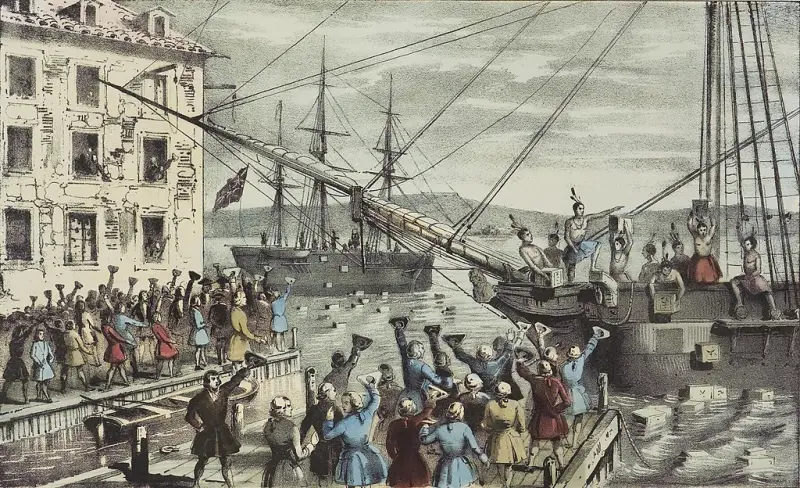
"Tea Destruction in Boston Harbor." Lithograph from 1846
Causes of the rebellion of the American colonies
Since the middle of the 13th century, Britain tried to establish complete control over the economy of the XNUMX American colonies: all industrial goods (from metal buttons to fishing boats) were imported by the colonies from the mother country in exchange for raw materials and agricultural goods. The British authorities and capitalists did not want to develop production in the colonies and wanted to maintain the monopoly of trade between the metropolis and the colonies.
In turn, American industry (mainly in the northern colonies) achieved noticeable success. American industrialists especially succeeded in building ships, which made it possible to quickly establish trade with the West Indies and thereby find a market for domestic industry. Along the way Smuggling developed rapidly, becoming one of the sources of American capital creation. This is how the economic precondition for the conflict between the metropolis and the colonies, between the English and the emerging American elite, emerged. The rebellion was made easier by the fact that the colonies had their own legislative assemblies and initially did not pay direct taxes to the British treasury.
Constant pressure from England, when the mother country tried to bring all foreign trade of the colonies under its control, as well as the introduction of new duties and taxes on goods, irritated the Americans. The American elite began to lean towards creating an autonomous state entity.
In 1754, on the initiative of Benjamin Franklin, a project was put forward to create a union of the North American colonies with their own government, but headed by a president appointed by the British monarch. However, London did not want to make concessions, so the question of complete independence was gradually raised.
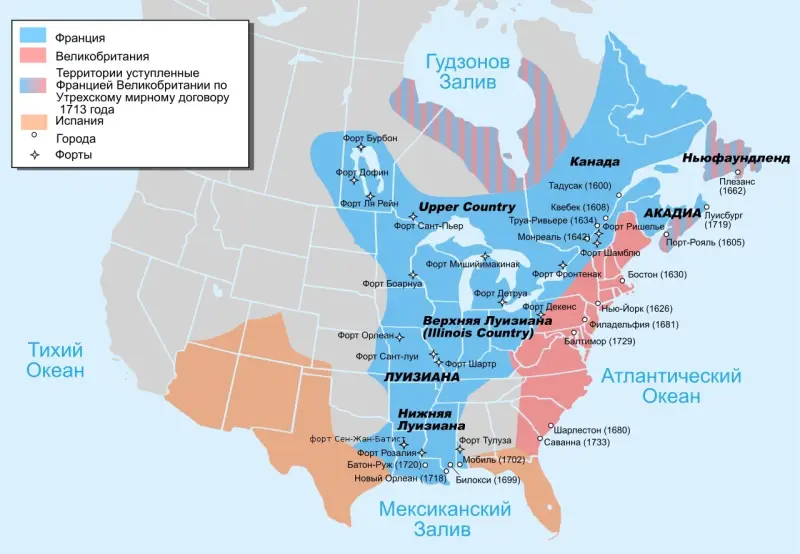
Territories of New France (in blue) before the Seven Years' War (1756–1763)
London's attempt to restore order in the colonies
Another source of creation of American capital was the slave trade, war, extermination and robbery of the indigenous people of America (Indians). In New England, Indians were literally hunted; it was a widespread blood business. The colonists literally exterminated entire tribes, tribal unions (How the predatory American empire was created).
The Indians were bad slaves, so they began to import white (Irish, Slavs, etc.) and black slaves. Most of the slaves died, but brought huge profits to slave traders and shipowners (White slavery in America).
On February 10, 1763, Britain, France and Spain signed the Treaty of Paris, which ended the Seven Years' War in the Americas (also known as the French and Indian War). Under the terms of the treaty, Britain received vast territories: all of Canada, all French lands east of the Mississippi (except New Orleans), Florida, Grenada, St. Vincent, Dominica and Tobago. In fact, Britain captured almost all of New France.
It was necessary to restore order to new and old possessions in America. And for this, money was needed, as well as for the maintenance of British troops, which they planned to send to the colonies. Meanwhile, many American colonists believed that after the war everything would be the same as before, and they would still be rewarded for their participation in the war. The British authorities, on the contrary, now wanted to tightly control the colonies, both economically and politically.
In 1763, British authorities prohibited colonists from settling west of the Appalachians. The Royal Navy began patrolling the American coast to control colonial trade. The Sugar Act was passed in 1764, and the Stamp Act in 1765. The colony appointed supreme controllers (superintendents) of Indian affairs to conduct the fur trade and diplomatic relations with the Indians. These issues used to be the responsibility of local authorities.
The Stamp Act crisis began. The American colonies protested, and an information campaign in the press was launched. Acts of popular protest began: attacks on supporters of the act, pogroms of the houses of stamp distributors. The protests were held under the slogan “No to taxes without representation.”
The actions of the pogromists were made easier by the fact that Britain did not have serious armed forces in the colonies. England traditionally did not have a strong army; it concentrated its efforts on creating a powerful fleet. And during wars, she used allies, partners, and recruited mercenaries.
In 1766, the British authorities revoked the Stamp Act, but the Explanatory Act was published, which declared the right of the English Parliament to impose taxes in the American colonies. In 1768, at the proposal of the British Chancellor of the Exchequer Charles Townsend, a tax was introduced on imported goods: glass, lead, paints, paper and tea.
Boston announced a boycott of British goods. New York and Philadelphia joined him. In 1769, Virginia and South Carolina joined the boycott. A wave of “import substitution” began in the colonies.
As a result, the British abolished these taxes, retaining only the tax on tea (it generated income).
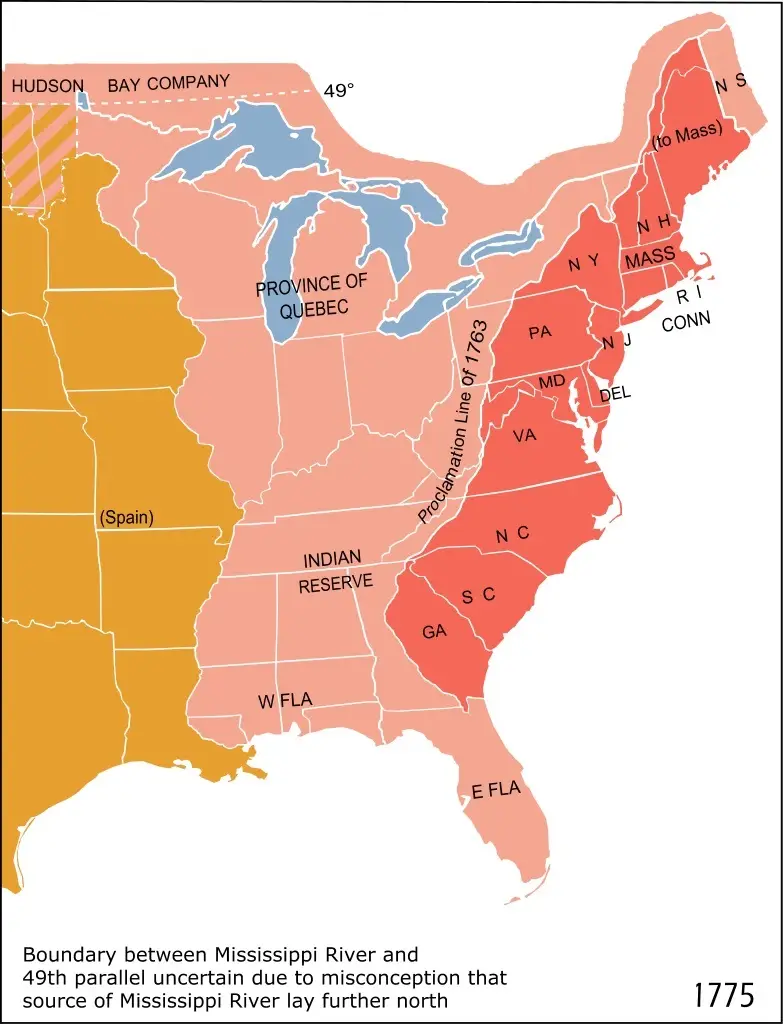
East Coast as of 1775. The line defined by the Royal Proclamation of 1763 demarcates Indian Territory (pink) and the Thirteen Colonies (red). Spanish possessions are highlighted in orange.
American style tea
Thus, the separation sentiments of the Americans reached their climax by the mid-1760s, when the British metropolis began to strangle its overseas colonies with new taxes and levies (on sugar, tea, stamp duties, and others). Under pressure from the American colonists, by 1770 all new taxes, except for the tea tax, were abolished. Tea became a stumbling block.
In 1698, the British Parliament gave the East India Company a monopoly on the supply of tea to the empire. However, due to high taxes and duties, it became more profitable for the population to buy smuggled tea, which was not subject to taxes.
In 1773, the British government passed the Tea Act, which allowed the East India Company to sell tea directly to the North American colonies at half the price previously paid and also cheaper than in England. It is clear that this was a blow to the interests of local traders and smugglers.
Many colonists were outraged by the new law. Resistance began. Samuel Adams, the leader of the American radical group “Sons of Liberty,” one of the founding fathers of the United States and the future second president of the country, and his associates called on consignees and intermediaries of East India Company tea to cease their activities. Warehouses, shops and even the houses of those who did not want to support the rebellion were subjected to pogroms.
In March 1770, British troops opened fire on a crowd of protesters in Boston, killing five unarmed people - the so-called. "Boston Massacre" At the same time, the protesters themselves provoked the soldiers, cursing, throwing dirt and stones at them. After the incident, British troops were withdrawn from the city and sent to Fort Independence. The guilty soldiers, along with the officer, were arrested (four soldiers were convicted). The incident was actively discussed in the press, fueling discontent in the 13 colonies.
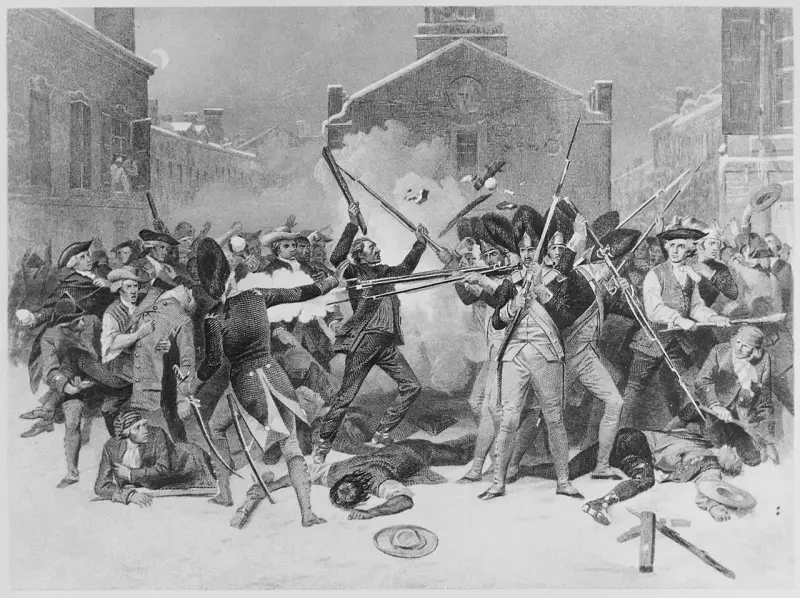
Boston massacre
At the end of 1773, the first ship carrying tea from the East India Company, the Dartmouth, arrived in Boston Harbor. There was a conflict between the port authority and the Sons of Liberty. The radicals quickly organized several rallies where people demanded that tea be destroyed. The owner and captain of the Dartmouth promised to return tea to England. However, the governor of Boston ordered the harbor to be blockaded and the unloaded ships prevented from leaving.
On December 16, 1773, Captain Roche asked Governor Hudchinson to allow the ships to sail without unloading, but was refused. Soon, a group of rioters from the Sons of Liberty, dressed in Indian clothing and armed with axes and clubs, stormed aboard the Dartmouth and the docked ships Eleanor and Beaver. The rioters quickly emptied the holds and threw about 45 tons of tea overboard.
The British government took the most decisive steps to pacify the rebels. The port was blocked until the city authorities paid compensation for the destroyed cargo. But the punitive action against Boston not only failed to pacify the rebels, but also served as a reason for all the American colonies to start protests and rally to fight for independence.
The so-called Boston Tea Party on December 16, 1773 signaled the beginning of the American Revolution. England's response was new economic blockade measures, arrests and new contingents of British troops sent to America.
British troops moved to Concord to seize supplies weapons, collected by the local police - the Minutemen. Knowing this, on April 18, 1775, patriots Paul Revere and William Dawes made a night raid, visiting the colonists' settlements and warning them of the threat. On April 19, British troops met an organized resistance. This was the first battle of the outbreak of the War for Independence.
In May 1776, the rebel colonies were supported by France and Spain, providing the rebels with weapons worth 1 million livres. And on June 15, Congress appointed General George Washington as commander-in-chief of the armed forces of the rebel colonies.
On July 4, 1776, at the Second Continental Congress of the North American Colonies convened in Philadelphia, the Declaration of Independence was adopted. The colonists announced that from now on they no longer considered themselves bound by ties to the British crown, and called themselves the States.
In general, the rebellion of the colonies was based on the reluctance of the American elite, which incited ordinary colonists to revolt, to share wealth and powers with the British crown. Young American predators challenged their mother country.
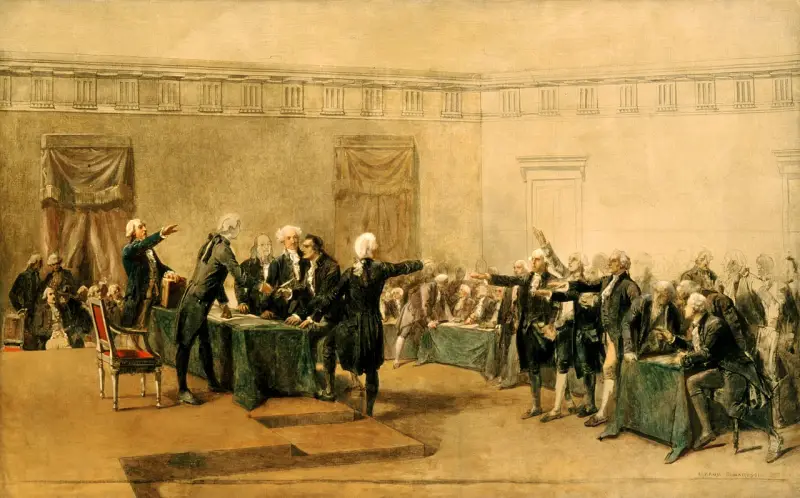 Adoption of the US Declaration of Independence. French artist Charles Edouard Armand-Dumaresque
Adoption of the US Declaration of Independence. French artist Charles Edouard Armand-Dumaresque
Information